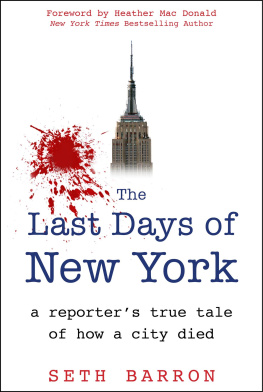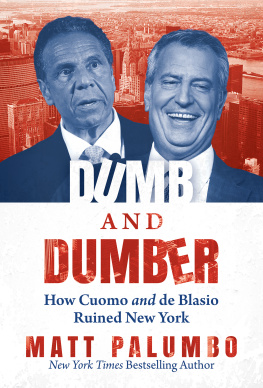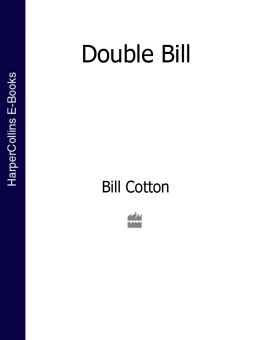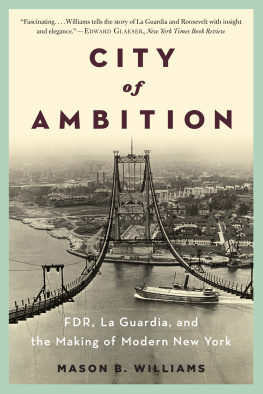Table of Contents
Guide
I am indebted to Carl Bromley at The New Press for shepherding this book to publication. Carls meticulous editing, incisive questions, and frequent suggestions for additional sources all dramatically improved the final product. Many thanks as well to Ellen Adler for taking a big risk in publishing a book on a subject that kept changing before our eyes, to Liana Krissoff for her wonderful copyediting, and to Emily Albarillo for her willingness to rearrange the schedule whenever I missed a deadline, and to Lissette Flores, as well, for her research assistance and transcribing of all interviews.
My gratitude to the score of grassroots activists, union leaders, and government officials in New York and a dozen other cities who graciously consented to be interviewed for this book. Thanks as well to all my colleagues at the New York Daily News, from which I retired in 2016. Most of the reporting on urban affairs reflected here took place during my twenty-nine years as a columnist at that paper, where many terrific colleagues routinely shared with me their own insights on the city, among them Jerry Capeci, Greg Smith, Barbara Ross, Ying Chan, Kirsten Danis, Jack Newfield, Tom Robbins, Bill Farrell, Michael Daly, and, of course, the legendary Pete Hamill.
I would also like to acknowledge the pioneering work of Charles Abrams, Roger Biles, Julian Brash, Robert Caro, Manuel Castells, Peter Dreier, Steve Early, Amy Hillier, Adrienne Holloway, Kenneth Jackson, Jane Jacobs, John Logan, Harvey Molotch, John Mollenkopf, James Parrott, Marsha Ritzdorf, Thomas Sugrue, and June Manning Thomas, all of whose scholarship shaped my understanding of urban governance and the central role of race and class in conflicts over land, space and place in the modern city.
Special thanks to Tom Robbins, one of New York Citys finest journalists and a good friend, for reading portions of the manuscript and providing valuable feedback. And finally, thanks to Lilia Fernndez, whose brilliance, devotion, and love have brightened my life in ways I never imagined.
To chronicle the story of a new and diffuse social movement is a daunting task for any writer, whether you are a daily journalist rushing to report some specific event in that movements life, a long-form narrator striving to interpret the growing movements broader impact, or an academic scholar who comes along years later to situate the movement within the grand arc of history. Each method has its limitations. Long-form narration in real time, the approach chosen here, has its own particular risks and perils. No one can predict, after all, how things will end. Popular revolts have a habit of starting one way and suddenly veering in a totally different direction. Political leaders often jettison their early ideals and adapt to new realities, or they are toppled by personal demons, or they succumb to the aphrodisiacs of power or money, or they simply decide to betray their original supporters.
Moreover, given the many months that typically elapse between completing a book of this kind and its release to the general public, major incidents sometimes transpire that eclipse or even contradict portions of the original account. As I was completing my final edits to this manuscript in March and April of 2017, for instance, unexpected developments took place that had the potential to alter the reelection prospects of two protagonists of this story, New Yorks Bill de Blasio and Seattles Ed Murray, and the election results in Jackson, Mississippi.
On March 16, after massive yearlong investigations into possible pay-to-play corruption in New Yorks city hall and allegations of campaign finance law violations, federal and state prosecutors announced they would not file criminal charges against Mayor de Blasio or any of his top aides and advisers. Given the months of public attention to their probes, both the U.S. Attorney for the Southern District of New York and the Manhattan District Attorney took the unusual step of publicly revealing their conclusions. In a one-page statement, federal investigators said they found the mayor and his aides had solicited donations from individuals who sought official favors from the city, and that de Blasio had subsequently intervened with city agencies on behalf of some of those same donors, but their probe found no evidence of personal profit by the mayor, and they thus concluded there was little likelihood of proving a crime had been committed.
On the same day, Manhattan District Attorney Cyrus Vance produced a more extensive ten-page summary of his inquiry into allegations by the state board of elections that de Blasio had violated campaign fundraising limits during the summer of 2014, when he raised millions of dollars from a few dozen wealthy donors and labor unions in a failed effort to help Democrats regain control of the New York state senate.
After reviewing more than one million documents, emails, and bank records, many of them obtained through subpoenas and search warrants, and after directly interviewing more than fifty people, Vance blasted de Blasios 2014 fundraising scheme as contrary to the intent and the spirit of the laws that impose campaign contribution limits, but he concluded that the mayor and his aides could not be charged with a crime, since they had consulted at every step with an attorney who was an expert in campaign finance law, and since that attorney had repeatedly advised them their actions were legal.
Vances letter, however, offered startling details of how de Blasio and those around him had resorted to the same kind of dark money fundraising and skirting of campaign spending limits that Democrats often accuse Republicans of employing. It also revealed that Governor Andrew Cuomo was initially involved along with de Blasio in approving the strategy, which top state Democrats dubbed the Coordinated Campaign.
The Putnam County Democratic Committee, for example, received more than $671,000 from a few wealthy donors that summertwenty times more money than it had ever received during a statewide election. Within days, the committee transferred $640,000 to the senate campaigns of two Democrats in the county, thus evading state law that limited individual donations of money to a political candidate to $10,300. Even more startling, the two Democratic senate candidates, according to Vance, then immediately expended virtually all of the funds on political consultants such as BerlinRosen, AKPD, and Red Horse Strategiesfirms whose executives were close friends or advisers of de Blasio.
In other words, the mayor and his aides raised the money, and then used the state committees as virtual pass through to the Democratic senate candidates, with those candidates spending the money on the very consultants who also happened to work for the mayor. New York campaign finance limits are so porous, Vance concluded, that this kind of end around did not rise to the level of a crime, though it certainly violated the spirit of the law.
The simultaneous decision of two law enforcement agencies to close their probes without a single indictment marked a major victory for de Blasio, who had always insisted he and his aides had broken no laws. It was a costly victory, however. The mayor was hounded for more than a year by press accounts that often depicted him as corrupt, and during that time he was unable to enact the kind of bold reforms that marked his first two years in office. The damage to his reputation among some voters was likely to endure. On top of that, he and his closest aides incurred tens of millions of dollars in legal fees responding to subpoenas for documents and sitting through lengthy interviews with investigators from two separate probes.
You cant imagine what its like to have the FBI knock at your door twice at seven oclock in the morning and slap you with a subpoena, said one mid-level Democrat who told me he incurred more than $250,000 in legal bills and who characterized the overzealous agents assigned to the probe as part of a witch-hunt.
Next page





